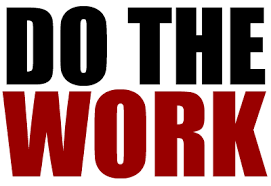Today’s guest blogger is Paul Doyle. Paul is an accomplished CEO and has a great passion for developing leaders. I asked Paul to contribute to this series because his advice is both practical and powerful. His focus is equipping leaders with skills they can use tomorrow. The ten powerful questions he shares are connected to the LeaderWork 10, and are the foundation of a ten-month leadership program that I collaborate with Paul to deliver. We just celebrated our third cohort graduation, and I have seen firsthand the impact these questions have on leaders that use them. Paul shares the habit that has enabled him to lead large, small, and medium-sized growing businesses and keep his actions and beliefs aligned amidst the chaos so his team could be successful.
The following content is the property of Paul Doyle and Leaderwork LLC and is shared on this blog with his full approval. Any reproduction or use of this material without his consent is not lawful. If you like it and want to use it somewhere else, just ask him directly using the link at the bottom of the post.
I’ve always viewed my responsibility as a leader is to create the environment in which others can achieve. Over the years, I have developed a list of questions that I ask myself at the end of each day (or at least I try to). In working through the daily set of challenges, changes, and chaos that is the life of every leader, this list has served as a check list to remind me of the work I should be doing as a leader.
Q1: Does my team know I am here for them? It is my responsibility to serve; know them, listen, support, coach, and help them.
Q2: Is my team inspired by a vision for their work? A cool and challenging purpose will pull effort from people. Clarity about the finish line will allow them to self-manage to a great extent.
Q3: Do the team members care about each other’s success? Do they have a shared fate? Are they working as a true team, not just a group of people reporting to me?
Q4: Is the work and the methods of working bringing out my team’s best effort? I can’t motivate anyone, that comes from inside, fear can come from outside, but it doesn’t last. Is every member of the team doing work they know and feel is important and are they clear they have the opportunity and freedom to affect how the work is done?
Q5: Does every member of the team know, all the time, if they are winning or losing? A scoreboard is a powerful tool. People want to be successful and when performance data is available most people use it to make things better.
Q6: Is the work organized such that it is easier for the team to succeed than to fail? My team needs the work to be structured and supported in ways that help them be productive. They want good tools, good information, a good plan, and good support.
Q7: Does each member of my team know their priorities? People prefer to be goal directed not just busy. People like the comfort from knowing they are working on the right things. It is my responsibility to provide a plan and communicate a set of priorities, so team members can get after it and feel confident that their work matters.
Q8: Is my team well informed? Communication, both inside the team and in the company, is critical for people to make a connection. People are more loyal, productive, and creative when they know what is going on. I need to connect team mates to one another and connect each team member to the company overall.
Q9: Have I challenged each team member to grow and learn more? People must continue to learn more every day so they can do a better job and most people want to continue to learn so they can get a better job. I am responsible to guide both questions for all team members.
Q10: Does every team member feel the creative tension to do better? Continuous improvement is not an option. Whatever we are doing today will be done better tomorrow by someone. If it is us – we win. If it is not us, we could be out of work. My team needs to feel that stretch.
Thinking through the list at the end of each day usually results in me realizing that some individual needs help in an area, and sometimes it reminds me that there is a big omission. Either way, a daily run through these questions helps me break out of the chaos and stay on top of what is my most significant responsibility – that is the work of leading.
Did Paul’s words and the questions he asks himself daily resonate with you? Learn more about the LeaderWork leadership development program by visiting the LeaderWork website or emailing Paul directly at paul.doyle@leader-work.com.

